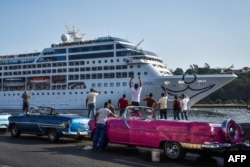For the first time in nearly four decades, a U.S. cruise ship has docked in Havana, opening another chapter in revived U.S.-Cuban relations after a half-century of hostility borne of the Cold War.
The Carnival Cruise Lines' Adonia and its 700 passengers left the port of Miami Sunday, arriving in Cuba Monday.
"To be part of truly making history and preparing for an even more positive future for everyone is one of the greatest honors any company can have," Carnival chief Arnold Donald said.
The Adonia will sail to Havana twice a month.
It is in marked contrast to the tens of thousands of Cubans who fled their homeland across the same Florida Straits for freedom in the United States in rickety boats and on home-made rafts over the last 50 years, thousands of them drowning on the journey, but even more reaching the U.S. and settling in a new country.
The voyage almost did not happen after Cuban authorities initially banned members of the Cuban diaspora from sailing back to their birthplace, fearing they would try to stir up political dissent. The matter was settled during talks between U.S. and Cuban officials.
Regular air service between the U.S. and Cuba is expected to resume later this year. The flights and the cruise ship visits by Carnival and other companies planning to start service to the Caribbean island nation could add tens of millions of dollars to the Cuban economy, even as a U.S. embargo on trade with Cuba officially remains in place.
The cruise ship visit comes about a year and a half after U.S. President Barack Obama and Cuban President Raul Castro renewed diplomatic relations between the two countries. Subsequently, the U.S. opened an embassy in Havana and Cuba in Washington.
Obama has eased trade with Cuba through executive orders, even as his Republican opponents in Congress refuse to lift the embargo.
Obama made a three-day visit to Cuba in March for talks with Castro, a state dinner and an exhibition baseball game between the Cuban national team and a U.S. professional team.





